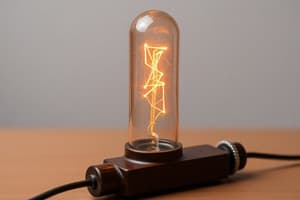Podcast
Questions and Answers
What is the primary function of the smooth muscle that wraps around arterioles?
What is the primary function of the smooth muscle that wraps around arterioles?
- To decrease the diameter of the vessel (correct)
- To regulate blood pressure
- To increase the diameter of the vessel
- To pump blood through the vessel
What is vaso-dilation?
What is vaso-dilation?
- The constriction of blood vessels
- The flow of blood through the vessel
- The regulation of blood pressure
- The dilation of blood vessels (correct)
What happens to the resistance to blood flow when there is vaso-constriction?
What happens to the resistance to blood flow when there is vaso-constriction?
- It remains the same
- It increases (correct)
- It is unaffected
- It decreases
Who contributed significantly to our understanding of blood flow and resistance?
Who contributed significantly to our understanding of blood flow and resistance?
What is the main reason why it is harder to blow air through the straw compared to the cardboard tube?
What is the main reason why it is harder to blow air through the straw compared to the cardboard tube?
What is the effect of vaso-dilation on blood flow?
What is the effect of vaso-dilation on blood flow?
What is the term for the constriction of blood vessels?
What is the term for the constriction of blood vessels?
What is the name of the French gentleman who asked a similar question a long time ago?
What is the name of the French gentleman who asked a similar question a long time ago?
What is the approximate radius of the cardboard tube?
What is the approximate radius of the cardboard tube?
Why is it easy to blow air through the cardboard tube?
Why is it easy to blow air through the cardboard tube?
What is the variable used to represent the length of the cardboard tube?
What is the variable used to represent the length of the cardboard tube?
What is the main difference between the cardboard tube and the straw?
What is the main difference between the cardboard tube and the straw?
What is the approximate radius of the straw?
What is the approximate radius of the straw?
What does the experiment demonstrate?
What does the experiment demonstrate?
What is the name of the scientist who put together a set of equations in the 1840s to help answer the question of fluid flow through tubes?
What is the name of the scientist who put together a set of equations in the 1840s to help answer the question of fluid flow through tubes?
What is the name of the property of a fluid that determines its resistance to flow?
What is the name of the property of a fluid that determines its resistance to flow?
What is the relationship between the radius of a tube and the resistance to fluid flow through it?
What is the relationship between the radius of a tube and the resistance to fluid flow through it?
What happens to the resistance to fluid flow through a tube if the radius is halved?
What happens to the resistance to fluid flow through a tube if the radius is halved?
What is the name of the part of the circulatory system that is analogous to a tube in the context of fluid flow?
What is the name of the part of the circulatory system that is analogous to a tube in the context of fluid flow?
What is the formula for resistance to fluid flow through a tube, according to the scientist mentioned in the passage?
What is the formula for resistance to fluid flow through a tube, according to the scientist mentioned in the passage?
What is the unit of measurement for viscosity?
What is the unit of measurement for viscosity?
What is the result of decreasing the radius of a tube on the resistance to fluid flow through it?
What is the result of decreasing the radius of a tube on the resistance to fluid flow through it?
What is the relationship between the length of a tube and the resistance to fluid flow through it?
What is the relationship between the length of a tube and the resistance to fluid flow through it?
What is the significance of the equation R = 8l / πr^4 in the context of fluid flow through tubes?
What is the significance of the equation R = 8l / πr^4 in the context of fluid flow through tubes?
Flashcards are hidden until you start studying
Study Notes
Experiment with Cardboard Tube and Straw
- A person takes a deep breath and blows out through a cardboard tube (like a toilet paper roll) with a length (l) and radius (r) of about 2 centimeters.
- The experiment is repeated with a straw, which has the same length (l) but a smaller radius (r') of about 1 centimeter.
- It is much harder to blow air through the straw than the cardboard tube.
Poiseuille's Equation
- Dr. Jean Louis Marie Poiseuille, a French scientist, developed a set of equations in the 1840s to explain the relationship between fluid flow and tube resistance.
- The equation states that resistance (R) is equal to 8 times the length (l) times the viscosity (eta) divided by pi times the radius (r) to the fourth power.
- R is proportional to 1 over r to the fourth power.
Application to Blood Vessels
- Blood vessels, like tubes, have resistance that affects blood flow.
- Arterioles, part of the circulatory system, have smooth muscle that can relax or constrict, changing their radius.
- When smooth muscle is relaxed (vasodilation), the radius increases, and blood flow is easy with low resistance.
- When smooth muscle constricts (vasoconstriction), the radius decreases, and blood flow is difficult with high resistance.
- Poiseuille's equation helps explain why changes in blood vessel radius affect blood flow.
Studying That Suits You
Use AI to generate personalized quizzes and flashcards to suit your learning preferences.




